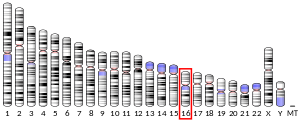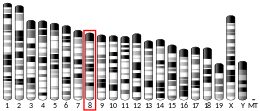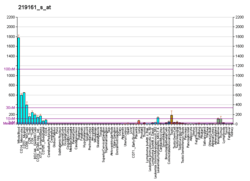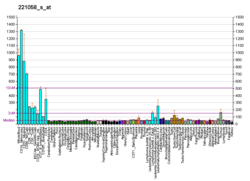CKLF (gene)
Chemokine-like factor is a protein that in humans is encoded by the CKLF gene.[5][6][7]
The product of this gene is a cytokine. Cytokines are small proteins that have an essential role in the immune and inflammatory responses. This gene is one of several chemokine-like factor genes located in a cluster on chromosome 16.
The protein encoded by this gene is a potent chemoattractant for neutrophils, monocytes and lymphocytes. It also can stimulate the proliferation of skeletal muscle cells. This protein may play important roles in inflammation and in the regeneration of skeletal muscle. Alternatively spliced transcript variants encoding different isoforms have been identified.[7]
References
- 1 2 3 GRCh38: Ensembl release 89: ENSG00000217555 - Ensembl, May 2017
- 1 2 3 GRCm38: Ensembl release 89: ENSMUSG00000054400 - Ensembl, May 2017
- ↑ "Human PubMed Reference:".
- ↑ "Mouse PubMed Reference:".
- ↑ Zhang QH, Ye M, Wu XY, Ren SX, Zhao M, Zhao CJ, Fu G, Shen Y, Fan HY, Lu G, Zhong M, Xu XR, Han ZG, Zhang JW, Tao J, Huang QH, Zhou J, Hu GX, Gu J, Chen SJ, Chen Z (Nov 2000). "Cloning and functional analysis of cDNAs with open reading frames for 300 previously undefined genes expressed in CD34+ hematopoietic stem/progenitor cells". Genome Res. 10 (10): 1546–60. doi:10.1101/gr.140200. PMC 310934. PMID 11042152.
- ↑ Han W, Lou Y, Tang J, Zhang Y, Chen Y, Li Y, Gu W, Huang J, Gui L, Tang Y, Li F, Song Q, Di C, Wang L, Shi Q, Sun R, Xia D, Rui M, Tang J, Ma D (Jun 2001). "Molecular cloning and characterization of chemokine-like factor 1 (CKLF1), a novel human cytokine with unique structure and potential chemotactic activity". Biochem J. 357 (Pt 1): 127–35. doi:10.1042/0264-6021:3570127. PMC 1221935. PMID 11415443.
- 1 2 "Entrez Gene: CKLF chemokine-like factor".
External links
- Human CKLF genome location and CKLF gene details page in the UCSC Genome Browser.
Further reading
- Boudinot P, Salhi S, Blanco M, Benmansour A (2002). "Viral haemorrhagic septicaemia virus induces vig-2, a new interferon-responsive gene in rainbow trout". Fish Shellfish Immunol. 11 (5): 383–97. doi:10.1006/fsim.2000.0326. PMID 11478515.
- Xia D, Li X, Lou Y, et al. (2002). "Overexpression of chemokine-like factor 2 promotes the proliferation and survival of C2C12 skeletal muscle cells". Biochim. Biophys. Acta. 1591 (1–3): 163–173. doi:10.1016/S0167-4889(02)00270-7. PMID 12183067.
- Ke X, Jia L, Jing H, et al. (2002). "Effects of novel human chemokine-like factor 1 (CKLF1) on bone marrow hematopoietic stem cell/progenitor cell in vitro". Zhonghua Xue Ye Xue Za Zhi. 23 (6): 301–3. PMID 12411060.
- Strausberg RL, Feingold EA, Grouse LH, et al. (2003). "Generation and initial analysis of more than 15,000 full-length human and mouse cDNA sequences". Proc. Natl. Acad. Sci. U.S.A. 99 (26): 16899–903. doi:10.1073/pnas.242603899. PMC 139241. PMID 12477932.
- Clark HF, Gurney AL, Abaya E, et al. (2003). "The secreted protein discovery initiative (SPDI), a large-scale effort to identify novel human secreted and transmembrane proteins: a bioinformatics assessment". Genome Res. 13 (10): 2265–70. doi:10.1101/gr.1293003. PMC 403697. PMID 12975309.
- Xu M, Han W, Qian M, et al. (2004). "Last intron of the chemokine-like factor gene contains a putative promoter for the downstream CKLF super family member 1 gene". Biochem. Biophys. Res. Commun. 313 (1): 135–41. doi:10.1016/j.bbrc.2003.11.100. PMID 14672709.
- Gerhard DS, Wagner L, Feingold EA, et al. (2004). "The status, quality, and expansion of the NIH full-length cDNA project: the Mammalian Gene Collection (MGC)". Genome Res. 14 (10B): 2121–7. doi:10.1101/gr.2596504. PMC 528928. PMID 15489334.
- Kimura K, Wakamatsu A, Suzuki Y, et al. (2006). "Diversification of transcriptional modulation: large-scale identification and characterization of putative alternative promoters of human genes". Genome Res. 16 (1): 55–65. doi:10.1101/gr.4039406. PMC 1356129. PMID 16344560.
This article is issued from
Wikipedia.
The text is licensed under Creative Commons - Attribution - Sharealike.
Additional terms may apply for the media files.





